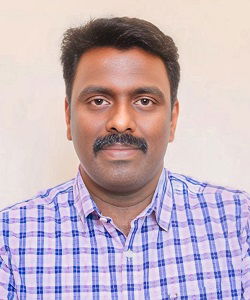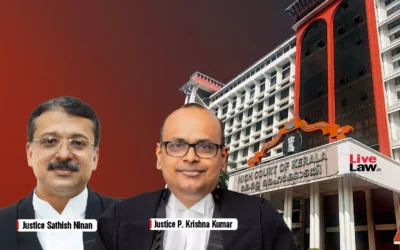Alex.V, Librarian at Mar Gregorios College of Law, Trivandrum on his Love for Supporting Legal Education

Interview conducted by Lekshmi m nair as a part of her Campus Leaders Program.
Could you please introduce yourself and tell us a bit about your background?
I am Alex.V, a dedicated librarian with over a decade of experience in academic library management. I currently serve as the Librarian at Mar Gregorios College of Law, Nalanchira, Trivandrum. My academic background includes qualifying the UGC NET in Library and Information Science, a Master’s degree in Library and Information Science from IGNOU, and a Bachelor’s degree in the same field from the University of Kerala.
I also hold a Diploma in Library Automation from Rajagiri College of Social Sciences, Kalamassery, and a Certificate in Library and Information Science (CLISc) from the State Central Library, Trivandrum.
With a strong foundation in both traditional and digital library systems, I am committed to enhancing user engagement, improving access to information resources, and embracing innovations in library technology to better serve the academic community.
What inspired you to pursue a career in library science, particularly in a legal academic setting?
I’ve always loved libraries because they’re places where people can learn and discover new things. I’m passionate about organizing information and helping others access knowledge, which is why library science was perfect for me. I believe that when people can easily find the information they need, it can really change their lives and help their communities.
I started in general academic work, but I was drawn to law libraries because of how precise and detailed legal research needs to be. Legal libraries have amazing resources, and the research is always challenging and interesting.
I love helping law students and professors find the information they need quickly and efficiently. It feels meaningful to support legal education and help people grow in their academic and professional careers.
If you hadn’t become a librarian, what alternative career path might you have taken?
If I hadn’t become a librarian, I might have ventured into scientific research or teaching, especially since I hold a B.Sc. in Chemistry. Science has always intrigued me, and contributing to education or research would have been a fulfilling path. At the same time, I’ve always had a deep passion for police service and other uniformed jobs.
The discipline, commitment, and opportunity to serve society directly through such roles have always appealed to me. Additionally, considering my strong interest in communication and content organization, careers in journalism or digital content management would also have been exciting and suitable alternatives.
What are your main responsibilities as a law college librarian on a daily basis?
My daily responsibilities include managing acquisitions, cataloguing, and classification, overseeing circulation, assisting users with legal research tools, maintaining digital resources, and training users in accessing online databases. I also handle the promotion of reading habits through programs and social media initiatives like Instagram and Linktr.ee.
How do you keep yourself updated with changes in legal publishing and research tools?
To stay updated with changes in legal publishing and research tools, I actively participate in professional development activities and knowledge-sharing platforms. I regularly attend workshops and conferences, including those focused on DSpace, open-access publishing, and digital repository systems.
These help me stay current with evolving trends in scholarly communication and information management. I’m also deeply involved in research-related training, having attended specialized workshops on tools like Google Scholar, ORCID, IRINS, and Vidwan, which are essential for managing academic identities and enhancing research visibility.
As an active executive committee member of the Kerala Library Association, I benefit from ongoing networking opportunities, updates on emerging library science practices, and access to collaborative discussions.
Additionally, I keep myself informed by reading professional journals, subscribing to newsletters from legal databases, and engaging in online librarian communities, where best practices and innovations are regularly discussed.
This combination of continuous learning, practical exposure, and community interaction helps me support legal education with the most relevant and up-to-date research tools.
Is there a specific area of law that interests you personally, even if you’re not a lawyer?
Yes, I am particularly interested in Information Law and Intellectual Property Rights. As someone deeply involved in digital resource management and open-access tools, these legal areas resonate with my work and values in information ethics and access.
Outside of your work, do you have any personal hobbies or interests related to books, writing, or education?
Yes, outside of my professional work, I have a deep personal interest in books, writing, and educational development. I enjoy exploring different genres of literature and often spend time reviewing or recommending books to peers and students. I’m also curious about the evolving landscape of library science, especially innovations in library technology, digital cataloging, and user-centered services.
Beyond that, I love playing badminton, which helps me stay active and refreshed. Traveling is another passion—I find it enriching to experience new cultures and ideas, which often inspires both my reading and professional perspective.
Watching meaningful movies is a favorite leisure activity, especially those with educational or social themes. Altogether, my hobbies keep me balanced and continuously learning, both personally and professionally.
What are the biggest changes you’ve seen in legal libraries over the last decade?
The biggest changes include the shift toward digital resources, the integration of library automation systems like Koha, and the rise of remote access tools. There’s also increased demand for training in e-resources and legal databases, along with growing expectations for libraries to act as active learning and research partners rather than passive repositories.
What has been one of the most memorable or rewarding experiences in your career?
One of the most rewarding experiences during my tenure as the Librarian at Mother Theresa College was when our “Birthday Book Basket” initiative was recognized as a best practice by the NAAC Peer Team. This program creatively encouraged students and staff to donate books to the library in celebration of their birthdays, promoting a strong sense of community ownership and involvement in library development.
Additionally, launching the college library website and initiating the library’s Instagram platform significantly enhanced user engagement. These digital efforts not only increased the visibility of library services but also connected us more effectively with students in a medium they were familiar with.
Together, these experiences demonstrated how innovative thinking and proactive outreach can transform a library into a vibrant center of learning and collaboration.
Do you think it’s important for the law college library to collaborate with international institutions? Are there any current or future plans to work with foreign libraries or share legal resources?
Yes, International collaboration is essential for resource sharing, exposure to global legal trends, and improving academic standards. While there are no formal tie-ups at present, we are exploring options for future collaborations through digital resource sharing, joint workshops, and open-access initiatives to bring global knowledge into our local academic setting.
Disclaimer: Interviews published on Lawctopus are not edited thoroughly so as to retain the voice of the interviewee.
This interview is a part of our Star Interview series, conducted by the Campus Leaders at Lawctopus. Stay tuned for more!

